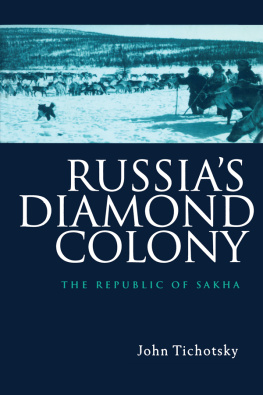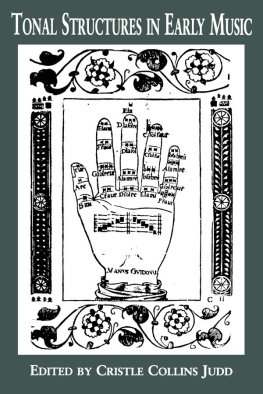T he manuscript of this book was revised with the support of a fellowship at the Center for Russia in Asia at the School of Hawaiian, Asian and Pacific Studies (University of Hawaii at Manoa) sponsored by the U.S. State Department. I thank Dr Robert Valliant, Director of the Center for Russia in Asia; Patricia Polansky, bibliographer of the Russian Collection of the Hamilton Library; and Dr John Stephan.
I am grateful to Dr Piers Vitebsky, my Ph.D. advisor, and his family (Sally, Patrick, Catherine and the Smackos Kid).
I am also very grateful for Dr Arlon Tussings (University of Alaska Anchorage) assistance and suggestions for my thesis. I thank Dr Terence Armstrong for his valuable advice. I also thank Sam Van Vactor (Economic Insights, Portland, Oregon), Dr Peter Nolan (University of Cambridge), Dr Dale Taylor (U.S. National Biological Survey), Dr Michael Kaser (University of Oxford) and Dr Michael Chisholm (University of Cambridge) for their help. I especially thank Phillip Hanson (University of Birmingham) for many insightful comments.
Thanks to Shannon Weiss of Illusions for design work.
I would never have been able to conduct the detailed field work for my thesis without the opportunity to work for the University of Alaska Anchorage and its Sakha-American Center, American Russian Center and Institute of Social and Economic Research. For this, thanks go especially to Victor Fischer and his family, Jane and Ruthie. Great thanks to Andrew Crow, the American Director of the Sakha-American Center (19931995) and Martha Olympic-Crow. Special thanks to Steve Colt, Lee Gorsuch, Dr Gunnar Knapp, Dr Jack Kruse, Dr Scott Goldsmith, Dr Greg Protasel, Marsha Trugeon, Lt. Colonel Russ Howell, Dr Doug Berry, Eric Downy, Clifford Gilman, Sean McKee and Lori Gregory.
Thanks to all the people in Sakha who helped me so very much, especially the people at the Sakha-American Center and the State University of Yakutsk: Dr Anatolii Alexeev, Dr Ivan Nikolaev, Nikolai Yegorich Nikolaev, Varvara Alexeeva, Dr Anatolii and Mrs Albina Gogolev, Dr Anatoli Popov, Anatolii Skrybikin, Dr Vasilii Fillipov, Ludmilla Mikhaleva, Lena Kurbanalyeva, Elena Alekseeva, Irina Veretelnikova, Natalia Ilina, Evgeniya Yartina, Olesha Nikiforov, Afonasi Alexeev, Sardana Alexeev, Konstantin Bely, Dimitrii Belinskii, Vasilli Kononov and the staff of the Neriungri Branch of the University.
The people who run Sakhas oil and gas industry, especially: Vera Popova, Peter Semeonov, Vasilii Efimov, Ruslan Shipkov and Peter Makarov.
Special thanks to Ustiniya Nikitichna Argunova, Anatolii Chomchoev and Dr Vasilii Yadrokhinskii.
For their assistance and time in Sakha, I thank: Maria Pogoda-yeva, Dr Vasilii Robbek, Sofia Berdnikova, Nikolai Burtsov, Inokenty Maximov, Dr Marshintsev and his staff, Dr Vladimir Larionov, Saken Oshakbaev, Bulat, Aleksey Tomtosov, Alexander Kougayevsky, Ivan Cherov, Vitali Artamonov, Nikolai Nakhodkin, Yuri Petrov, Valeri Krasnoshtanov, Anatoli Goldman, Anatoli Novikov, Grigory Velvin and the staff of the College of Northern Minorities, Alexander Matveev, Valary Stepanov, Mr Gladkin, Nikolai Fedorov, Svetlana Ponomareva, Nikolai Rudakov, Alexander Vasilev and Afanasi Safronov.
Very special thanks to Dr Tom and Marnie Albert for their guidance and friendship. I was extremely grateful for the opportunity to work in the North Slope Borough for the Department of Wildlife Management, the Mayors Office, the Office of Public Information and the Alaska Eskimo Whaling Commission. I am especially grateful to George Ahmaogak, Warren Matumeak, Burton Rexford, Maggie Ahmaogak, Charlie Brower, Margaret Opie, Marie Adams, Ben Nageak, Jeslie Kaleak, Deloras Vinas, Harry Brower, Craig George, Taqulik Opie, Robert Sudam and Lisa Delarosa. Thanks also to the people from the Eskimo Society of Chukotka and the Naukan Native Company, especially Ainana, Michael Zelensky, Vladimir Bychkov and Igor Zagrebin.
In Alaska, I am extremely grateful for all the assistance, support and kindness I received from: Jane Whitmore; Bond Whitmore and Dr Dorothy Whitmore; Craig, Nancy, Corrie and Bristol Whitmore; Shirley Taylor; Sergei Chulaki and Natasha Strelkova; Peter Richter; Joe Bondurant; Barbara Gruenstein; Jim Hart; and Ian Penny.
In the UK, I thank Qiu Shi (Shirley), Zheng Hua, Qiu Shu Feng, Keith Hill, Isabella Warren, Tanya Argunova, Dr John Heap, Dr Peter Williams, Ben Seligman, Teresa Clarke, Irene Burns, William Mills, Shirley Sawtell, Dr Ian Whittiker, Paul Fryer, Paul Taylor-Crush, Angela Reid (Barclays Bank) and the 199596 MPhils (especially Cap tains Joseph Wubbold and Lawson Brigham).
In Seattle, I thank Ann Kalberg of ART A and Richard Fischer of US Leasing Corporation.
In Moscow, I extend my thanks to Roland Nash, London School of Economics representative and Dr Grigorii Agranat of the Russian Academy of Sciences.
In Magadan, thanks to Dr Alexander Pilyasov.
In Sakhalin, thanks to Dr Mikhail Bok, Boris Minaev and Tatiana Kim.
Thanks to the people of Jesus College, especially, Dr B.A.K. Rider, Dr Jana Howlett, Dr Jeff Harcourte, Brenda Welch, Alan Day, Margaret Davey, Mary Watts, J.N.H. Lacey and I.M. Le M. Du Quensnay.
Thanks to D.P.F. McCallum and his staff at the Board of Gradu ate Studies for helping me with my many paperwork problems.
Thanks to everyone who makes the Scott Polar Research Insti tute, the University Library and the Marshall Library run so well.
Thanks to Dr and Mrs Vladimir Melnikov (Vladivostok), for getting me an excellent statistical bulletin about the Russian Far East.
Thanks to Dr Evgenii Bogdanov, for teaching me so much about the Russian gold industry.
Thanks to Hannah Core.
Many, many thanks to my wife, Mary Core, for so very much.
T he Republic of Sakha (Yakutia)1 is a little known, remote political unit of the former Soviet empire. Sakha covers the largest land area2 within the Russian Federation. It is one of Russias most resource rich regions. Simultaneously, Sakha is Russias primary diamond producing region, yielding 25 per cent of the worlds dia monds, and one of the most prospective regions in the future struc ture of Asias natural gas supplies. Sakha also has a particularly strong, ethnically based local government. For all these reasons Sakha is one of the more interesting regional economies to crystallize in post-Soviet Russia.







